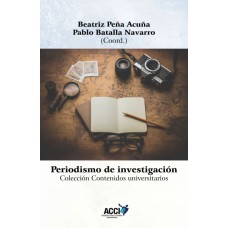El periodismo de investigación es una disciplina a reivindicar hoy más que nunca. Son muchos los temas que hay que comentar y actualizar al respecto. También exponemos el cambio que supone el uso de las Nuevas Tecnologías como herramienta para el proceso de investigación. Emular a Bob Woodward y a Carl Bernstein actualmente no es tarea fácil, aunque el propósito no sea tan ambicioso como derrocar a un presidente de los Estados Unidos con un escándalo como el Watergate, hito en la materia.
La crisis ha puesto a prueba la calidad del periodismo de investigación en España, y las grandes cabeceras y medios de comunicación han dado la talla, desenmascarando los grandes problemas estructurales de nuestra sociedad. Desde 2007, los medios de comunicación no han dejado de publicar escándalos de corrupción política y financiera como los casos Gürtel y Púnica, el escándalo de los ERE, los papeles de Panamá, las tarjetas Black, el caso Caja Madrid, el caso Noos y un largo etcétera de investigaciones desarrolladas por medios locales y de alcance más regional.
El periodismo de investigación ha actuado en estos últimos tiempos como válvula de escape y ha canalizado la indignación de la población, dejando constancia de su valía y reivindicándose como un instrumento útil de cohesión social, regeneración institucional y estado democrático.
Este texto, escrito con un lenguaje asequible, está dirigido al público general y a miembros académicos (profesores y alumnos) de Comunicación
Research journalism is a discipline to claim today more than ever. There are many issues to be discussed and updated in this regard. We also explain the change in the use of New Technologies as a tool for the research process. Emulate Bob Woodward and Carl Bernstein currently no easy task, even if the purpose is not as ambitious as to overthrow a president of the United States with a scandal like the Watergate, milestone in the matter.
The crisis has tested the quality of investigative journalism in Spain, and the big headlines and media have given size, unmasking the major structural problems of our society. Since 2007, the Media have not stopped publishing scandals of political and financial corruption such as the Gürtel and Punic cases, the scandal of the ERE, the papers of Panama, the Black cards, The Caja Madrid case and a long list of investigations developed by local means and of more regional scope.
Research journalism has acted in these recent times as an exhaust valve and has been channeled the indignation of the population, leaving a record of its value and claiming itself as a useful instrument of social cohesion, institutional regeneration and democratic state.
This text is addressed to the general public and academic members (teachers and students) of Communication.
La crisis ha puesto a prueba la calidad del periodismo de investigación en España, y las grandes cabeceras y medios de comunicación han dado la talla, desenmascarando los grandes problemas estructurales de nuestra sociedad. Desde 2007, los medios de comunicación no han dejado de publicar escándalos de corrupción política y financiera como los casos Gürtel y Púnica, el escándalo de los ERE, los papeles de Panamá, las tarjetas Black, el caso Caja Madrid, el caso Noos y un largo etcétera de investigaciones desarrolladas por medios locales y de alcance más regional.
El periodismo de investigación ha actuado en estos últimos tiempos como válvula de escape y ha canalizado la indignación de la población, dejando constancia de su valía y reivindicándose como un instrumento útil de cohesión social, regeneración institucional y estado democrático.
Este texto, escrito con un lenguaje asequible, está dirigido al público general y a miembros académicos (profesores y alumnos) de Comunicación
Research journalism is a discipline to claim today more than ever. There are many issues to be discussed and updated in this regard. We also explain the change in the use of New Technologies as a tool for the research process. Emulate Bob Woodward and Carl Bernstein currently no easy task, even if the purpose is not as ambitious as to overthrow a president of the United States with a scandal like the Watergate, milestone in the matter.
The crisis has tested the quality of investigative journalism in Spain, and the big headlines and media have given size, unmasking the major structural problems of our society. Since 2007, the Media have not stopped publishing scandals of political and financial corruption such as the Gürtel and Punic cases, the scandal of the ERE, the papers of Panama, the Black cards, The Caja Madrid case and a long list of investigations developed by local means and of more regional scope.
Research journalism has acted in these recent times as an exhaust valve and has been channeled the indignation of the population, leaving a record of its value and claiming itself as a useful instrument of social cohesion, institutional regeneration and democratic state.
This text is addressed to the general public and academic members (teachers and students) of Communication.
Periodismo de investigación - Research journalism
-
Coordinador:
Beatriz Peña Acuña
Pablo Batalla NavarroAutor:
Beatriz Peña AcuñaPablo Batalla NavarroEva Herrero CurielNatalia BergerEkmel GecerJohana KotisováMaría Elena Del Valle - Código del producto: 7345
- Colección: Contenidos universitarios
- Categoría: Calificadores de FINES EDUCATIVOS, Economía, finanzas, empresa y gestión, Lenguaje y lingüística, Matemáticas y ciencias, Para sistemas educativos nacionales o regionales concretos, Industria y estudios industriales, Lingüística, Ciencia: cuestiones generales
- Temática: Noticias y periodismo, Aplicaciones industriales de investigación científica e innovación tecnológica, Bilingüismo y plurilingüismo, Nivel universitario/Superior
-
ISBN:
- 9788416549740 - Papel Cómpralo aquí
- 9788416549757 - ePub Cómpralo aquí
- Tamaño: 150 x 230 mm
- Páginas: 162
- Idioma: Español / Castellano
- Interior: B&N (Estándar) + Color (Estándar)


